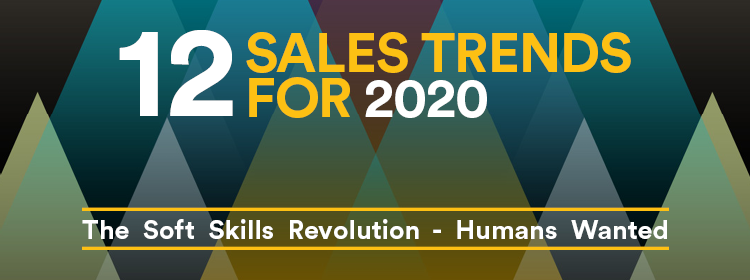
Blog Podcast
Soft Skills are the new hard skills for the 4th Industrial Revolution, and Sales Trend 11 from the Barrett 12 Sales Trends Report for 2020 highlights the importance of developing these skills, as individuals, as leaders, and for our teams and businesses.
 Deloitte Access Economics forecasts that soft skill-intensive occupations will account for two-thirds of all jobs by 2030, compared to half of all jobs in 2000. The number of jobs in soft-skill intensive occupations is expected to grow at 2.5 times the rate of jobs in other occupations. That’s a big workforce change, similar in magnitude to other major trends, like the shift from ‘blue-collar’ to ‘white-collar’ work, and the growing participation of women in the workforce.[1]
Deloitte Access Economics forecasts that soft skill-intensive occupations will account for two-thirds of all jobs by 2030, compared to half of all jobs in 2000. The number of jobs in soft-skill intensive occupations is expected to grow at 2.5 times the rate of jobs in other occupations. That’s a big workforce change, similar in magnitude to other major trends, like the shift from ‘blue-collar’ to ‘white-collar’ work, and the growing participation of women in the workforce.[1]
While AI (Artificial Intelligence) is currently stealing the lime light and creating anxiety about loss of jobs, it’s the emergence of the power of soft skills that will be the making of humans in the workplace across industry in the 21st century.
While AI can deliver well on iterative and predictive tasks, humans are better at leading, creating, improvising and empathising. As intelligent technology begins to take on more of the repetitive, mundane and transactive work, humans will be freed up to do more complex, sensitive and higher value work, like building relationships and dealing with exceptions.
Accenture describes the future of work as having four defining features: it is human and digital, cooperative and collaborative, knowledge and task-based, and flexible and fluid. It requires a tech-capable, responsive and adaptive workforce.
Humans and machines can amplify each other’s abilities, but soft skills—human skills—will be the future differentiators.
Soft skills are referred to as employability and enterprise skills. They are transferable between industries and occupations. Soft skills include things such as communication, teamwork, and problem solving, as well as emotional judgement, professional ethics and global citizenship.
Those with the right skills will increasingly call the shots, create opportunities and choose how, where and when they work.
While technology enhancements such as AI enable many routine technical tasks – like operating machinery, bookkeeping, data entry, document search, client management, etc. – to be automated, the world, especially the world of business, is becoming more complex and buyers are looking to engage with other humans to help them navigate and work through this complexity, to sift and sort information and make informed decisions.
We need to teach people how to think, not just what to think.
This means that businesses are increasingly relying on critical thinking, emotional judgement and problem solving skills in their staff to not just understand what technology is saying, but to analyse why it is saying it, and what ought to be done. Then, on top of this, their people need to be able to engage and work with customers/buyers, internal stakeholders and suppliers across the whole value chain to ensure that they can attract, serve and retain the right people to do business with.
Trust in human interactions
The ‘customer service automation pendulum’ has seen many businesses cut down the cost of servicing customers by making interactions as automated as possible, but the pendulum is swinging back to the sensible centre because of the increasing dangers of the online world – issues regarding privacy, identity theft and fraudulent online operators-. People need and want to trust who they are dealing with which is where human interaction comes into play.
Developing the softs skills of our employees is beneficial for business and customers
This sales trend shows that having staff who are competent and confident in soft skills will become more important than ever as a way for businesses to connect with customers and differentiate themselves from their competition.
It’s been estimated that employees with effective soft skills could increase revenue by more than $90,000.
It has also been found that people with better interpersonal and self-management skills, such as team work, collaboration, communication skills, problem solving and critical thinking to name a few, make and create much healthier (i.e. mental health), more productive and happier customers and work environments.
Sales and Services Skills – the ultimate in Soft Skills Capabilities
Sales and Service are the epitome of Soft Skills; they are ubiquitous but very poorly understood and applied for the most part.
The expression ’great salespeople are born not made’ is a myth of epic proportions. Most people can learn how to apply soft skills which means they can learn how to sell and service. However, The Deloitte Access Economics Report shows that:
- Communication skills are in short supply
- One quarter of all workforce have difficulty filling entry level vacancies because of a lack of soft skills
- Three quarters of organisations report a workforce skills gap in soft skills
Soft skills have essentially been taken for granted by business and they have been largely ignored by mainstream education and pushed to one side in favour of technical skills – the hard skills.
We know only too well how hard it has been to get the Profession of Selling recognised at a university level. We managed to get selling a University qualification in 2012 – a Diploma of Business – after many, many years trying. Our work at Barrett has unpacked a myriad of soft skills that are relevant to sales and service people, but also relevant to humans across the board.
We have invested years in developing a Soft Skills competency framework, education, content and tools in soft skills that teaches people how to apply these soft skills in their daily work practices and in life – while most of our work is in the sales and service space for obvious reasons, the pathway to taking these practices to the broader workforce and community is wide open.
Our careers, our organisations and our communities’ successes depend on the cultivation of healthy human relationships and interactions more than ever before. The time is NOW for us to embrace our inner ethical human centred salesperson, regardless of whether we call ourselves a salesperson or not.
The future is human.
[1] https://www2.deloitte.com/content/dam/Deloitte/au/Documents/Economics/deloitte-au-economics-deakin-soft-skills-business-success-170517.pdf
Related topics
12 Sales Trends for 2020 – The Time is Now
Why the federal government should be teaching businesses how to sell
AI, Data Analytics & Selling Certainty
A year ago
Building trust through personal image


New Article Email Notification